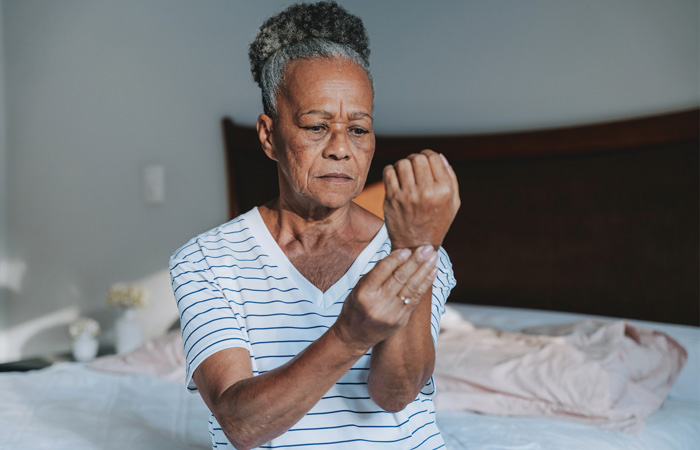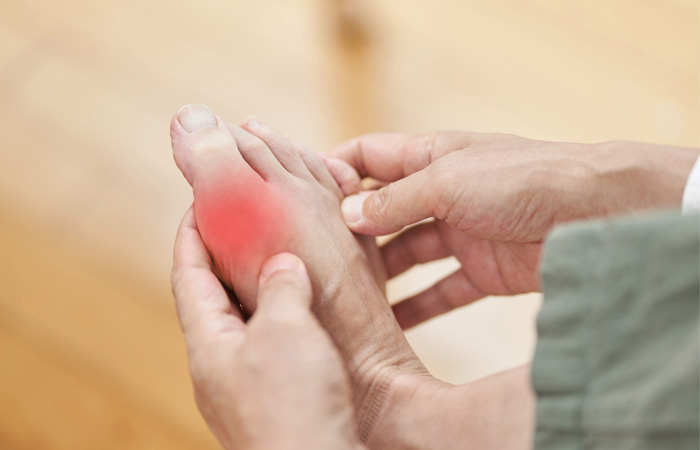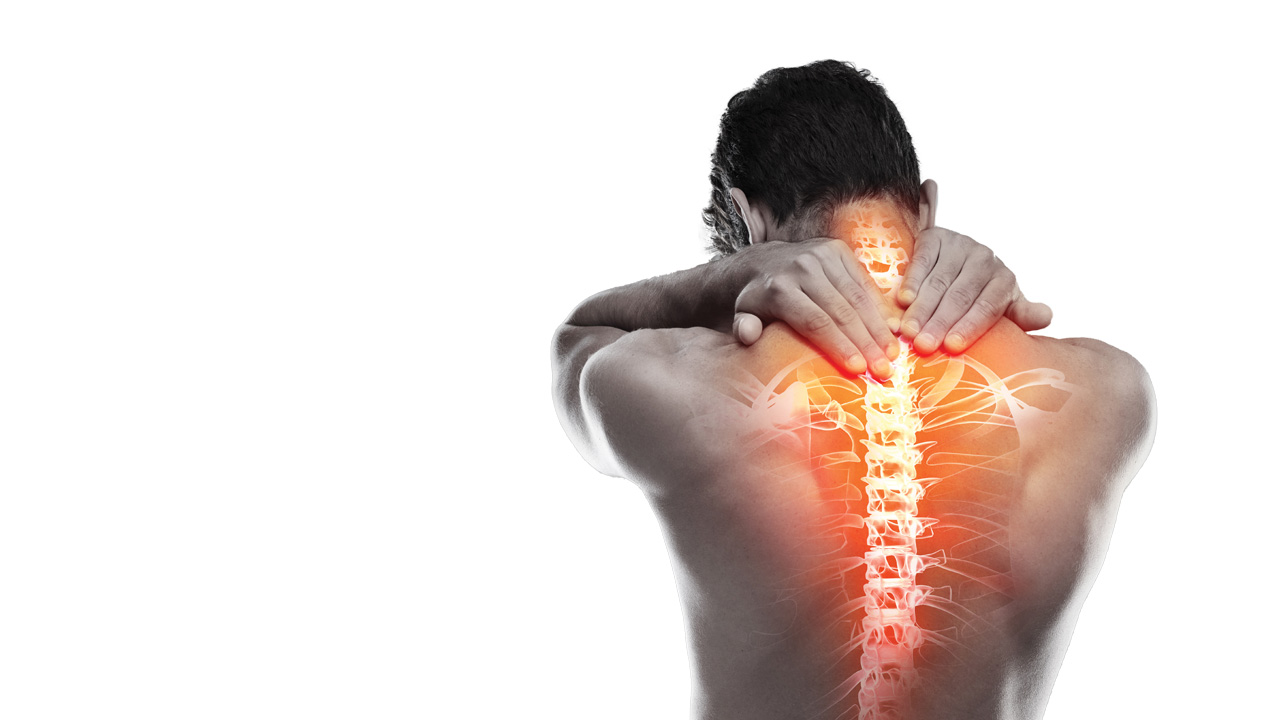In OTC
Follow this topic
Bookmark
Record learning outcomes
Nearly one in three people in the UK – more than 20 million patients – has a musculoskeletal (MSK) condition affecting their joints, bones or muscles. This can result in pain, restricted movement and disturbed sleep – which can also potentially take a toll on relationships, careers and mental health. It has a major impact on the health service, too: according to NHS England, MSK complaints account for up to 30 per cent of GP consultations. Meanwhile, new figures just released in December 2024 by the Department for Work and Pensions found that 646,000 people were off work with MSK conditions.
You can’t predict the weather
During the winter months, patients may feel that their pain is worsening. “Joints often hurt more in the cold and especially in damp weather,” says Dr Wendy Holden, consultant rheumatologist and medical advisor to Arthritis Action (arthritisaction.org.uk). “We don’t know why, but it may be due to changes in air pressure.” Scientists at the University of Manchester found that people with chronic health conditions were 20 per cent more likely to suffer from pain on damp and windy days with low pressure.
However, a new study published last year in the journal Seminars in Arthritis and Rheumatism found that “despite anecdotal reports from patients, changes in weather factors do not seem to be risk factors for rheumatoid arthritis, knee, hip, or low back pain.” An exception was gout, where warm, dry conditions were associated with increased pain. The authors went on to observe that while the weather did not seem directly linked to increased pain, changes in behaviour may be contributing factors – for example, people changing their exercise or sleep routines in winter.
Taking action
If joint pain strikes, pharmacy teams can refer patients to a doctor if concerned, rather than patients attempting to self-diagnose. However, once the problem has been identified, there is much scope for pharmacy teams to support customers with self care advice and suitable over-the-counter (OTC) products – always taking into account the patient’s age and any contraindications. Here we take a closer look at some conditions you may encounter.

Pain can often get in the way of daily activities so it’s important customers tackle it earlier rather than later.
Arthritis
There are many different types of arthritis, including osteoarthritis (OA), rheumatoid arthritis (RA) and gout.
Osteoarthritis is by far the most common, affecting an estimated 10 million patients in the UK. “Osteoarthritis is associated with age and joint injury, and causes pain, stiffness and swelling, often in the weight-bearing joints like hips and knees, as well as the fingers, neck and lumbar spine,” explains Dr Holden. “It is due to cartilage loss and subsequent damage to pain-producing tissues around the joints.” Management is symptomatic, she continues, and self care steps include exercising and keeping to a healthy weight.
Rheumatoid arthritis is the most common type of inflammatory arthritis, affecting around 450,000 patients. “The body’s immune system starts to attack the joints,” says Dr Holden. “This causes swelling, stiffness and pain and can happen at any age, including in children. Management is to try to dampen down the immune system with medication designed to prevent joint damage, as well as self-management as above.” RA is typically symmetrical (for example, affecting both hands, or both knees, etc.) and people experiencing symptoms should see their doctor as soon as possible; if diagnosed, patients will often be prescribed disease modifying anti-rheumatic drugs (DMARDs).
Gout occurs when the body’s urate level is too high and small crystals form in and around the joints (often the big toe), which can lead to severe pain, inflammation and stiffness. It’s more common in men, and can be triggered by (among other things) drinking too much alcohol, dehydration or injury. Patients experiencing symptoms for the first time should see their GP. Attacks may be treated with an NSAID such as ibuprofen, or patients may be prescribed medication to lower their urate level.
While arthritis can affect anyone, prevalence of osteoarthritis increases with age, rising to almost half of over-75s. In terms of OTC products, occasional NSAIDs such as ibuprofen may be useful, says Dr Holden, although “they should be used at the lowest possible dose for the shortest time”.
Over the longer term, lifestyle measures are more important, she continues. “Losing just 10 per cent of body weight [if necessary] can significantly reduce pain; similarly, exercise to build up muscle around the joints can reduce pain by a third in the knees.” Dr Holden says exercise wise “anything and everything” is beneficial. “Strengthening or resistance exercise to build muscle, stretching to help flexibility, and aerobic for cardiovascular health and stamina. Walking and swimming are especially good, but more importantly doing something enjoyable so that it can be kept up – for example, Tai Chi, yoga, dance or even gardening.” It’s advisable for patients to check with their GP before embarking on a new exercise programme.
Eating healthily is also a key part of arthritis management, adds Dr Holden. “Omega 3 fish oils in the diet may help, but having a balanced diet – preferably Mediterranean to boost gut health and help with weight management – is best.”
Stop the pain cycle
Period pain can be a real misery for patients, ranging from a dull ache to severe and debilitating cramps; it may also be accompanied by symptoms such as tiredness, bloating or headaches. In milder cases, it may be eased by a suitable OTC painkiller such as paracetamol or ibuprofen. Other self-care measures could include gentle exercise (such as walking or yoga), a warm bath, or holding a hot water bottle wrapped in a tea towel against the abdomen.
However, if period pain is severe or worsening – or the patient is experiencing other symptoms such as pain during sex, an abnormal vaginal discharge, or bleeding between periods – they should be referred to their GP. Sometimes the pain may be connected to a condition such as endometriosis, pelvic inflammatory disease or fibroids.
“We would urge anyone who is experiencing pain that is debilitating (stopping them from doing daily activities) to speak to a healthcare professional without delay, especially if over-the-counter medication is not helping,” says Kate Shepherd Cohen, founder and CEO of Menstrual Cycle Support (menstrualcyclesupport.com), a pioneering service “delivering menstrual health literacy on social prescription”.
She continues: “Social prescribing is the ability for clinicians to refer patients to a range of non-clinical activities – for, example, walking groups for loneliness. We receive UK-wide referrals from primary, secondary and social care. Pharmacies can become Menstrual Cycle Support partners so that patients can access the courses for free – please contact us for more information via the website.”
The interactive courses are available for teenagers and for adults, and can be accessed on any device. “They take 40-60 minutes and are divided into 10-minute modules for ease; we recommend participants complete the course over two to three menstrual cycles,” continues Shepherd Cohen. Participants will be taught a “simple mindful practice called ‘menstrual cycle awareness’ – learning how to tune into your cycle every day and phase so you can get the support you need” and information about how best to chart it, plus how to spot red flags.
“For a pharmacy, the most effective help would be to put up a Menstrual Cycle Support poster with a QR code to the course – by virtue of the poster itself, menstrual stigma is dismantled; free support is given,” adds Shepherd Cohen. “Our first Impact Report revealed that, following completion of the course, a significant number of course participants had increased confidence to speak to a healthcare professional and get the support they need.”
“Rheumatoid arthritis is the most common type of inflammatory arthritis, affecting around 450,000 patients”
Back pain
Most people experience back pain at least once in their life, according to the World Health Organization. This common complaint can have a number of causes, from a strain to a slipped disc or even poor posture. “If you look back at cavemen and women, they were more active; we’ve become more sedentary,” says integrative therapist Jamie Lloyd (jamielloyd.co.uk). “If you’re going to sit down for 40 hours a week, you’re going to get tight glutes and eventually lower back pain.” He adds that people often forget about the impact of stress – for example, following a bereavement, separation or house move – which can result in tension and pain.
Back pain will often ease within a few weeks and for milder cases, a suitable OTC anti-inflammatory such as ibuprofen or diclofenac may be helpful. Products for back and muscle aches often come in a range of formats – including tablets, patches, roll-ons, gels and sprays – so patients can find the one that’s most convenient for them.
Meanwhile, some people may find heat packs and ice packs useful, and these are available in many pharmacies. Heat helps to relieve joint stiffness or muscle spasms, whilst cold reduces swelling – cold packs can be wrapped in a tea towel prior to applying.
However, if the pain persists or is severe, the patient should see their GP. It’s important not to just ignore aches and pains, says Jamie. “I see a lot of people who have put off dealing with pain for months or years – they try to muddle through until they’re in dire straits,” he says. “It’s like servicing a car: you don’t wait until the engine packs up and it doesn’t move.
“The older we get, the more we have to pay attention to our bodies, especially now the population is living longer. I offer many different services – including massage, electrotherapy such as TENS, ultrasound – and I’m an integrated nutrition coach, then once I get people out of pain I educate them on rehabilitation to get them back into sport and daily life.”
You can reassure patients that many people recover well from back pain. However, they should call 999 or ask someone to drive them to A&E if:
- The pain started following an accident, such as a car crash
- They think they have broken a bone
- They are also experiencing tingling or numbness in both legs or around the buttocks/genitals, loss of bowel/bladder control or difficulty urinating, or chest pain.
Patients should see their GP urgently or call 111 if their back pain is accompanied by a lump or swelling, high fever, or unexplained weight loss; or if it is higher up between the shoulders. This list is not exhaustive, and any patient whose pain is severe or getting worse should seek medical attention.

Symptoms of gout can often be managed with changes to lifestyle.
“Heat helps to relieve joint stiffness or muscle spasms, whilst cold reduces swelling”
Pain and mental health
Unsurprisingly, pain can have a major impact on a patient’s mental health. One study of more than 1,000 patients with chronic pain, published in PAIN: The Journal of the International Association for the Study of Pain, found that more than half (60.8 per cent) met criteria for probable depression, with a third (33.8 per cent) meeting the threshold for severe depression. Other research suggests a potential ‘chicken and egg’ relationship between mental health and certain pains. For instance, studies found that depression and anxiety were linked to a higher risk of migraine and chest pain.
Signs of depression might include:
- Feelings of despair, anger, emptiness or finding no enjoyment
from life - Constant tiredness
- A lack of appetite or, conversely, comfort eating
- Low sex drive
- Reluctance to socialise
- Increased use of cigarettes, alcohol or drugs
- Unexplained physical aches and pains.
Signs of anxiety could include:
- Trouble sleeping
- Feeling tense
- A racing heartbeat or dizziness
- Catastrophising
- Struggling to concentrate
- Stomach problems or headaches.
There are many self care steps that patients can try to improve their mental health. These include:
Eating well: A healthy, balanced diet with plenty of fruit and vegetables is good for both mental and physical wellbeing. The mental health charity Mind has a dedicated section on food on its website (mind.org.uk).
Staying active: A comprehensive 2023 Australian study, published in the British Journal of Sports Medicine, found that “physical activity is 1.5 times more effective than counselling or the leading medications” for managing depression.
Making time to relax: Patients may find meditation or simple breathing exercises beneficial.
Talking to someone: The Mind website (mind.org.uk) has useful information on how to find a peer support group, either online or in the local area. Meanwhile, adult patients in England can refer themselves directly, via the NHS website, to an NHS talking therapies service for anxiety and depression.
Avoiding smoking, alcohol or drugs: as these can all contribute to health problems. Patients should also try to cut down on their caffeine consumption, as this can affect sleep.
Getting back to nature: Studies have found that spending time outdoors, such as gardening or walking, can help to improve mood and reduce stress. Recent research from King’s College London, published in Scientific Reports, found that spaces with a larger number of natural features were linked with greater mental wellbeing, with benefits lasting for up to eight hours.
Patients should see a doctor if they are experiencing depression symptoms “most of the day, every day” for more than a fortnight, says the NHS website, or if they are struggling to cope with anxiety. In a mental health emergency – for example, if they feel their safety or someone else’s is at risk – they should call 999.

Staying active has many physical benefits, but it can also support mental health, too.

